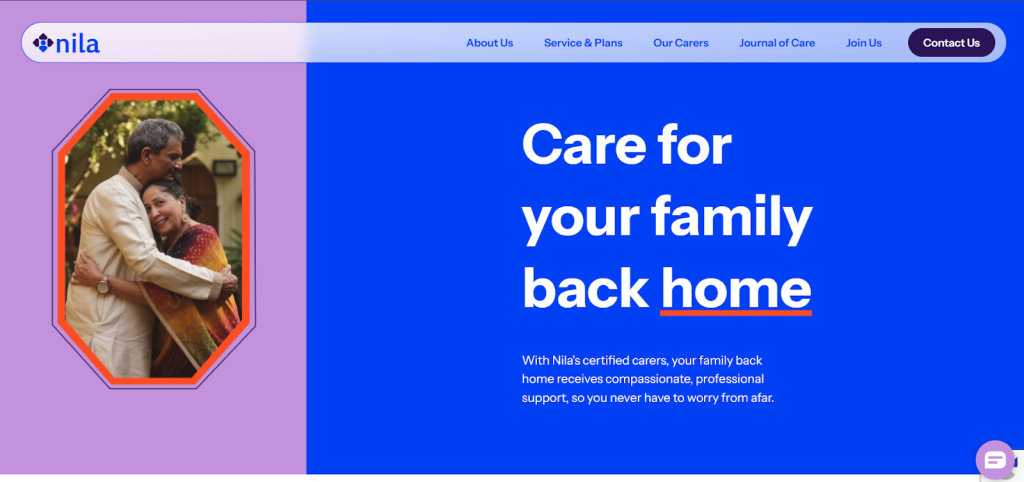Nila Raises $2.4M Pre-Seed to Redefine Cross-Border Elder Care with AI and Local Trust Networks
October 23, 2025
byFenoms Start-Up Research

Nila, the London-based healthtech startup founded by Anthony Jacob, has raised $2.4 million in pre-seed funding led by LocalGlobe, with participation from Redbus Ventures and several notable angel investors. The company is building an AI-powered care coordination platform that allows families abroad to manage elderly care for loved ones in their home countries - beginning with India and expanding across Asia.
A Global Problem Hidden in Plain Sight
Across the world, millions of expatriates wrestle with the guilt and chaos of managing their parents’ care remotely. Coordinating home visits, hospital checkups, medications, and payments across time zones isn’t just emotionally draining - it’s nearly impossible to do reliably. Nila was born from that gap. Its mission is simple yet deeply personal: to give families the ability to care from anywhere, without compromise.
Through its AI-driven platform and network of “Nila Certified” carers, the company connects families abroad with trusted local professionals who provide on-the-ground support - while its digital layer manages scheduling, payments, health monitoring, and status updates.
Nila’s technology doesn’t attempt to replace human caregivers; it amplifies them. By blending automation and empathy, it transforms fragmented healthcare interactions into a single, visible, and accountable system.
Technology Meets Human-Centric Execution
What differentiates Nila is its hybrid design. It uses algorithmic intelligence to triage care requests, route tasks, and surface real-time updates - but the work is delivered by locally trained, certified carers who understand community dynamics, language, and trust. This dual system allows Nila to balance scalability with intimacy, a crucial factor in elder care.
While many healthtech platforms focus on digital engagement alone, Nila’s product philosophy is “technology in service of touch.” That approach has resonated not only with families but also with investors who see it as a scalable infrastructure for a global caregiving crisis.
And here lies a powerful founder insight: the strongest startups in deeply human sectors don’t compete by out-innovating - they compete by out-understanding. Anthony Jacob’s team didn’t build around cutting-edge algorithms or futuristic hardware. They built around lived reality - the calls at 3 a.m., the hospital visits no one could attend, the remittance transfers delayed at the worst moments. In a world obsessed with building new technology, Nila found its edge in rebuilding trust at scale.
This kind of product intuition - solving the unsexy, hard coordination problems that others ignore - often becomes the true differentiator. Founders chasing big outcomes can learn from this: the companies that quietly make invisible workflows seamless often outlast those chasing the spotlight. Markets reward those who take operational pain and turn it into institutional reliability. That’s the invisible moat Nila is constructing, one verified carer and one family at a time.
Why Now: The Cross-Border Care Wave
Demographic and societal trends are creating an urgent opportunity. Populations in Asia are aging faster than local care infrastructure can expand. Meanwhile, the global diaspora - particularly professionals in Europe, the U.S., and the Middle East - now numbers in the hundreds of millions. This dynamic creates an enormous, emotionally charged market: families willing to pay for trust, transparency, and continuity of care.
Nila positions itself as the bridge between these worlds. The platform’s core AI model is designed not just for logistics but for context - understanding family priorities, risk profiles, and health patterns to anticipate care needs before they escalate into crises.
By localizing training, ensuring transparency in payments, and aligning with existing clinical networks, Nila is crafting a care ecosystem that can flexibly expand across regions where the problem looks similar but the delivery must remain local.
Backing from Global Investors
LocalGlobe and Redbus Ventures were drawn to Nila’s combination of technological sophistication and real-world applicability. The funding will be used to grow its certified carer network across India, deepen AI functionality, and prepare for expansion into new markets such as the Philippines, Sri Lanka, and Indonesia - regions with similar family and diaspora dynamics.
Early traction suggests the model is both scalable and sustainable: carers receive better wages and training, families gain transparency, and the health system benefits from fewer preventable emergencies.
Building the Infrastructure of Remote Care
Beyond its immediate impact, Nila’s long-term ambition is to become the default coordination layer for global elder care - a system where care records, payments, and service providers interact seamlessly, regardless of geography. To achieve that, the startup is building partnerships with clinics, insurers, and remittance platforms, creating an ecosystem where trust and interoperability drive value.
By doing so, Nila is not only improving how families care for elders - it’s redefining how cross-border health infrastructure itself could function. The key is simplicity: families shouldn’t need to understand healthcare bureaucracy, payment rails, or logistics. They should only need to trust that care is happening, and that it’s done right.
The Path Ahead
With its $2.4 million pre-seed round secured, Nila plans to focus the next 12–18 months on three key priorities: expanding its certified workforce, integrating predictive AI for proactive care alerts, and building institutional partnerships to embed Nila’s platform into hospitals and insurers.
If successful, the company could become a blueprint for a new category - one that sits at the intersection of healthtech, fintech, and social infrastructure. Nila’s quiet revolution lies not in flashy technology, but in building systems that endure, scale, and heal.









